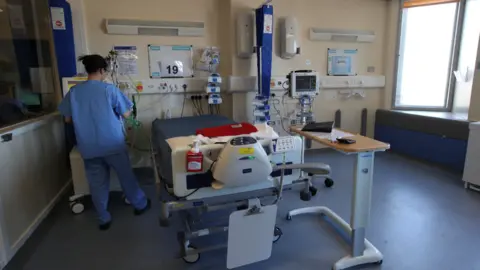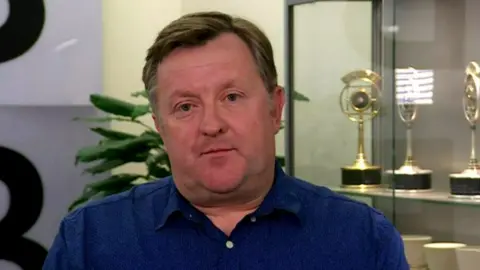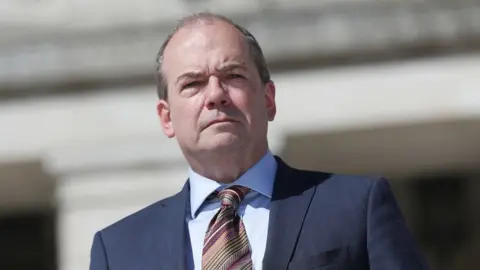Covid-19: Cancer surgery 'cancelled for 275 people in past week'
 Pacemaker
PacemakerSome 275 people in Northern Ireland with "red-flag" cancer have had their surgery cancelled in the past week, the Royal College of Surgeons has said.
Its Northern Ireland director Mark Taylor said the health service was in the "worst possible situation".
Some health trusts have cancelled urgent cancer surgeries, saying they had no option due to the pressure put on services by the Covid-19 pandemic.
Mr Taylor said: "We want to get surgery back up and running."
Speaking on BBC News NI's The View, he welcomed the decision to deploy more than 100 military medics to help staff in hospitals.
Mr Taylor said: "Any asset that can be brought in... means that we have a better chance of getting those poor people - 275 red-flag cancelled cancer patients in Northern Ireland in the last week - back to the operating theatres.
"So I would welcome all help from wherever it comes."
He added: "We are in the worst situation possible.
"We actually have more patients in respiratory wards and in intensive care than we have ever had.
"We have more people in intensive care with Covid at the moment than we normally would have had intensive beds.
"On top of that, there's another 51 patients in the intensive care units as well and the knock-on effect of all of that, it affects me and my colleagues in terms of those patients waiting for time-dependent critical surgery that are not able to have that."

On Thursday, the chief executive of the Belfast health Trust told Stormont's health committee that some patients whose cancer surgeries have been postponed may get their procedures too late.
Dr Cathy Jack said people were being offered chemotherapy "to buy time".
She said: "Whilst the majority will be safe to do that, there will be a small but significant proportion of people, when they come to surgery, it will be too late and the disease will have spread.
"And that, for us, is something we would never ever ever anticipated that we would be in our lifetime and I cannot apologise enough."
Dr Jack said talks were being held to work out how private healthcare providers could help in the latest phase of the pandemic.
She said a small number of private lists were being used for surgeries with low-risk cancers.
More would be freed up in March to "allow us to try and catch up on the backlog" of operations, she added.
The Western Trust said on Friday that despite "extreme pressures" it hoped to start rescheduling cancer surgeries from Monday.
"Whilst very challenging, we hope to be in a position from Monday 25 January to reschedule a number of the patients who had their red flag cancer surgeries/procedures cancelled over past week," said director of acute services Geraldine McKay.
"We will continue to review this decision regularly in line with the ongoing pressures due to Covid-19 in our Hospitals and particularly in our ICUs."
On Thursday, the NI Executive backed proposals by the health minister to extend lockdown in Northern Ireland until at least 5 March.
Chief Medical Officer Dr Michael McBride said the "sustained pressure on our health service" would probably last for another three to four weeks.
"We have seen levels of community transmission fall because of the restrictions the executive brought in on 26 December," he told The View.
"We're still seeing over 700 to 1,000 cases each and every day.
"We're now experiencing perhaps the worst ever pressures on our health and social care system - we've over 800 people in our hospitals, we've over 70 people in intensive care [with Covid-19].
"Our health service is currently under pressures like it has never been under before.
"Day and daily our frontline staff are having to make very difficult decisions, they're under extreme pressure and we all have to act now to ensure that decisions are made whereby we can continue to break chains of infection."
 PA Media
PA MediaAlso speaking on The View, Bob Brown, director of nursing/primary care and older people's services in the Western Health Trust said staff would welcome any help that could be provided.
He said this would include "military support to provide additional care in our hospitals and wherever that's required."
He added: "I think that is a very positive step forward - we're a system, we work together and that should be continued across all of health and social care."
